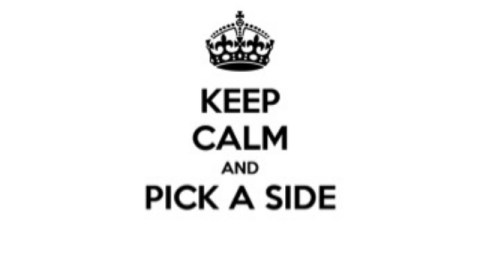The New York City Mayoral Race: A Voting System Built for Warfare

As I walked around New York City today, I spotted a poster advertising British soccer—the poster read, “Keep Calm and Pick a Side”—and I immediately had an epiphany about modern politics.
Like the narratives of modern sports, which are built on archaic war metaphors (“offense” vs. “defense,” “victors,” “vanquished opponents,” etc.), modern politics is, philosophically and systematically, designed to emulate ancient warfare. Nowhere is this more apparent than in our voting system itself, which legally requires us to “keep calm and pick a side.”
In warfare, this makes sense; in ancient times, with multiple tribes or ethnic groups battling over a single territory, one could not stand idly by without choosing a side. One had to decide which side he was on, and fight (or at least cheer from the sidelines) accordingly. The concept of supporting multiple sides makes no sense whatsoever in warfare, which, by definition, is based on a zero-sum worldview where one side must “win” and the other sides must “lose.” Similarly, supporting multiple sides makes little sense in sports, where there is, again by definition, a single “winner” and multiple “losers.”
But, in politics, this archaic worldview breaks down. Democracy, a system that supposedly encourages groups of people to make collective decisions, is not a zero-sum system. Just because there may be one “winner” in an election does not mean that an entire group of people (his so-called “supporters”) must equally consider themselves “winners”—which makes the rest of the voters “losers.” Unlike warfare and sports, democracy supposedly encourages all people to work together to make a collective decision. The only real “winner” or “loser” at the end of an election is the entire group of voters—all of whom are affected by the outcome, and whose wishes may or may not have been quantified by the voting system they employed to make their collective decision.
Why is this important? The entire narrative of modern politics is about “picking a side,” but I argue that this mythology is not only dangerous but also fundamentally incorrect. Unfortunately, we have legally enshrined this violent and corrupt ideology in the form of our “single choice” voting system, which, again, literally forces us to “pick a side”—just one, single side, at the exclusion of all others.
Take a look at the current New York City mayoral race. With at least five viable (and broadly supported) candidates, many voters would likely support multiple candidates if they could. For example, I might really like four of the five Democratic candidates, all of whom have similar views, but dislike the other one. Wouldn’t it be great if I could express my full support for the four candidates I like? (And effectively vote against the candidate I dislike?) But in our current “single choice” voting system, I am forced to “pick a side.” But which side should I pick? I am forced to make an arbitrary, perhaps completely strategic, decision; in fact, I might not even vote for my favorite candidate at all, since I might not think he is a “front runner,” and I don’t want to waste my “single choice” on someone who isn’t likely to win—as this would effectively neuter my ballot and give me literally zero influence towards the final outcome (and perhaps allow the one candidate I dislike to win). Instead, I am likely to hunker down, begrudgingly “pick a side,” cheer pathetically from the sidelines in support of my candidate, and hope that I chose wisely.
In New York City, the narrative for the mayoral race doesn’t have to be based on archaic notions of warfare or ra-ra sports machismo, but could instead be an example of modern democracy. I like four candidates for Mayor; why am I legally restricted from supporting all four of those candidates on my ballot? This simple form of “multi-choice voting,” called Approval Voting, would give me direct input into all the candidates on the ballot—no longer forcing me to “pick a side.” And in democracy, unlike in war or sports, isn’t having more choices (and being allowed to support any and all “sides” you like) better for everyone?





